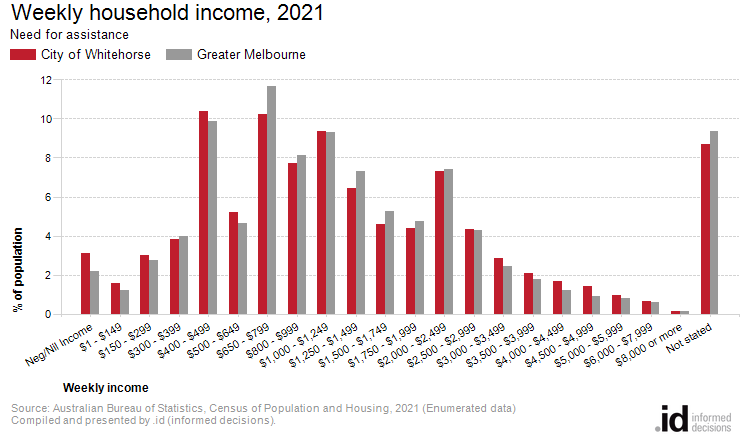City of Whitehorse
Need for assistance - Household income
In the City of Whitehorse, 14.0898% of people reporting a need for assistance were in households earning an income of $2,500 or more per week.
Households form the common 'economic unit' in our society. The City of Whitehorse's Household Income is one of the most important indicators of socio-economic status. For people with a disability or need for assistance, household income is an important indicator of the level of ability to participate in Australian society and economy. It is closely tied to employment status and occupation and should be viewed in conjunction with those topics.
Please note that any persons in a household who need assistance will be counted at this topic. There may be other household members who do not require assistance.
The incomes presented on this page are for the latest Census year only. For comparison of incomes over time, go to Household Income Quartiles.
Derived from the Census question:
'What is the total of all wages/salaries, government benefits, pensions, allowances and other income the person usually receives?'
People with a need for assistance, counted in private dwellings
| Weekly household income | |||||||
|---|---|---|---|---|---|---|---|
| City of Whitehorse - Need for assistance | 2021 | ||||||
| Weekly income | Number | % | Greater Melbourne | ||||
| Neg/Nil Income | 186 | 3.1 | 2.2 | 28001 | |||
| $1 - $149 | 94 | 1.6 | 1.2 | 28002 | |||
| $150 - $299 | 180 | 3.0 | 2.7 | 28003 | |||
| $300 - $399 | 230 | 3.8 | 4.0 | 28004 | |||
| $400 - $499 | 622 | 10.4 | 9.9 | 28005 | |||
| $500 - $649 | 313 | 5.2 | 4.7 | 28006 | |||
| $650 - $799 | 612 | 10.2 | 11.7 | 28007 | |||
| $800 - $999 | 463 | 7.7 | 8.1 | 28009 | |||
| $1,000 - $1,249 | 561 | 9.4 | 9.3 | 28010 | |||
| $1,250 - $1,499 | 384 | 6.4 | 7.3 | 28011 | |||
| $1,500 - $1,749 | 276 | 4.6 | 5.3 | 28012 | |||
| $1,750 - $1,999 | 261 | 4.4 | 4.7 | 28013 | |||
| $2,000 - $2,499 | 437 | 7.3 | 7.4 | 28014 | |||
| $2,500 - $2,999 | 260 | 4.3 | 4.3 | 28015 | |||
| $3,000 - $3,499 | 171 | 2.9 | 2.5 | 28016 | |||
| $3,500 - $3,999 | 123 | 2.1 | 1.8 | 28017 | |||
| $4,000 - $4,499 | 100 | 1.7 | 1.2 | 28018 | |||
| $4,500 - $4,999 | 86 | 1.4 | 0.9 | 28019 | |||
| $5,000 - $5,999 | 56 | 0.9 | 0.8 | 28020 | |||
| $6,000 - $7,999 | 39 | 0.7 | 0.6 | 28021 | |||
| $8,000 or more | 8 | 0.1 | 0.2 | 28022 | |||
| Not stated | 521 | 8.7 | 9.4 | 28098 | |||
| Total people counted in private dwellings | 5,983 | 100.0 | 100.0 | ||||
Source: Australian Bureau of Statistics, Census of Population and Housing (opens a new window) 2021 (Enumerated data). Compiled and presented in profile.id by .id (opens a new window) (informed decisions).

Compiled and presented by .id (informed decisions).
Dominant groups
Analysis of household income levels for people reporting a need for assistance in the City of Whitehorse in 2021 compared to Greater Melbourne shows that there was a larger proportion of people with a need for assistance in high income households (those earning $2,500 per week or more) and a higher proportion in low income households (those earning less than $650 per week).
Overall, 14.0898% of people reporting a need for assistance were in households who earned a high income, and 27.1602% were in low income households, compared with 12.1435% and 24.6507% respectively for Greater Melbourne.
The major differences between the incomes for households with people reporting a need for assistance in the City of Whitehorse and Greater Melbourne were:
- A larger percentage of people in households who earned Neg/Nil Income (3.1% compared to 2.2%)
- A smaller percentage of people in households who earned $650 - $799 (10.2% compared to 11.7%)
- A smaller percentage of people in households who earned $1,250 - $1,499 (6.4% compared to 7.3%)
- A smaller percentage of people in households who earned Not stated (8.7% compared to 9.4%)
